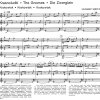Dwarfs
Dwarfs for piano (1953)
{slider=Krasnoludki. Kołysanka}
Kazimierz Serocki - piano, Warszawa 1953
{/slider}
{slider=Dwarfs, miniatures for children. Krakowiak}
Kazimierz Serocki - piano, Warszawa 1953
{/slider}
{slider=Dwarfs, miniatures for children. Kujawiak}
Kazimierz Serocki - piano, Warszawa 1953
{/slider}
{slider=Dwarfs, miniatures for children. Mazurek}
Kazimierz Serocki - piano, Warszawa 1953
{/slider}
{slider=Dwarfs, miniatures for children. Oberek}
Kazimierz Serocki - piano, Warszawa 1953
{/slider}
{slider=Dwarfs, miniatures for children. Piosenka}
Kazimierz Serocki - piano, Warszawa 1953
{/slider}
{slider= Dwarfs, miniatures for children. Walczyk}
Kazimierz Serocki - piano, Warszawa 1953
{/slider}
The elements of Dwarfs are characteristic Polish folk dances interspersed with “popular”, easy pieces of cheerful nature and high didactic values. The dances have metres, tempos and rhythms typical of their folk originals, and the entire work is based on a well thought-out dramatic design, characterised by expressive variability and strong finale – the lively Oberek.
As the work became very popular, in 1975 Serocki arranged the miniatures for various instrumental trios, including guitar trio and recorder ensemble.
Sheet music available from: PWM



